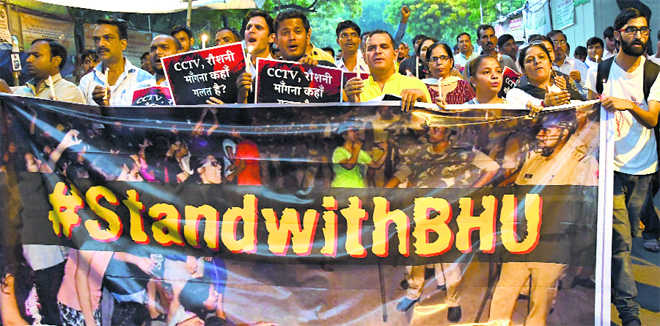Varanasi is now used to the VVIP visits: September 22-23 were to be usually special days as Prime Minister Narendra Modi travelled to his constituency — his first visit after BJP's resounding victory in the UP Assembly polls about six months back. The PM was to launch over a dozen welfare projects. Everything looked normal, except a ‘minor’ stir: On September 22, girl hostellers of Banaras Hindu University held a 12-hour demonstration protesting molestation and unbridled gender bias on the campus.
The next day, hours after the PM left the city, the university was engulfed in turmoil with reports of boy hostellers joining the protest retaliating against the police cane-charge at the Vice Chancellor Lodge on the BHU campus. A crisis unfolded. And there were obvious lies.
The National Human Rights Commission has issued a notice to the vice chancellor, taking cognizance of the “unwarranted manhandling and thrashing of agitating students, mostly women, by the UP Police”. Vice-chancellor GC Tripathi initially denied that woman students were hit during the crackdown. “There was no baton-charge on any girl … Action was taken against criminal and anti-social elements who (vandalized) varsity property,” he said. Later he went on leave. The state government has formed a panel and replaced the proctor.
This is the state of affairs of a university where the country’s finest luminaries once congregated. The BHU decline over the years is evident from a fact of history: there was a time more than six decades back, when students agitated that eminent socialist thinker Acharya Narendra Dev should join the university as early as possible. And today, the students forced the present V-C, considered close to the RSS, to proceed on leave.
Take a look at BHU’s internal politics. First the students’ union:
- In 1958, the union was banned for eight years after a strike.
- Following the death of two students in 1997 in police firing, the students’ union was banned again for an indefinite period.
- In 2011, the university introduced students’ council in place of a union. In the students’ council, every class elects its representative. The elected representatives in turn elect the general secretary.
In 2011, Lalji Singh, a scientist and a recipient of the Padma Shri Award, was chosen as the V-C. He is referred to as the father of DNA fingerprinting in India. Prof Tripathi took his place when his term ended in November 2014. Formerly with Allahabad University, Prof Tripathi is known for his Hindutva leanings. He was chosen by a search-cum-selection committee headed by justice (retd) Giridhar Malviya. The HRD ministry also appointed Prof Tripathi as the chairman of the IIT-BHU, ignoring the list the institute had provided.
The university has many issues to grapple with. The present V-C has allowed selective political activities, which his predecessor had thwarted. Students have repeatedly said that the authorities were not acting on their complaint. “Had the VC had met the protesting students and promised action against the accused, nothing of this sort would have happened,” says a professor.
Dr Deepak Malik, who was associated with the university from 1964 to 2012 —first as student and then as teacher — says forced attempts to depoliticize the campus have resulted in the communication gap between the university authorities and students, teachers and employees. He recalls that while Jawaharlal Nehru was responsible for the selection of Acharya Narendra Dev as the V-C, the successive selections reeked of mediocrity. “In the absence of any students, teachers or employees unions, the V-C became the administrator whose main job was to maintain law and order.”
Dr Malik says when the computer centre was set up near the administrative block, the students demanded that there should not be any dress code, and that they should be allowed to stay at the centre till midnight. But the university authorities insisted on a dress code and an early time for the centre to close.
Faculty members say that the present V-C is known to have close ties with the present government, and that he has limited academic background. “Only rightwing parties and organizations have made inroads into the university,” says a faculty member.
It was because of this mindset the rules were framed to discriminate between boys and girls. They have separate time schedules. When girls complained about molestation, the university authorities, including the V-C, questioned the girls and their attitude rather than taking action against the guilty. Several girl students have complained that the campus was badly lit and that there were no CCTVs. "Boys from outside can easily trespass and move out without any resistance," says a girl student. Many girl students say the PM too ignored their protest during his visit to the holy city.
The university authorities have appointed first woman chief proctor, Dr Royna Singh, in place of ON Singh who took moral responsibility for the lathi-charge and resigned. The new proctor has promised uniform time schedule for boys and girls and said that there would be no dress code for girls. She said 65 CCTVs would be installed at sensitive points. The BHU control room has issued two helplines where girl students can register their complaints and get a response within 10 minutes. The proctor’s board would have girl research scholars as members. To prevent trespassing, the BHU proctor has enforced strict checking of ID cards of girls and boys.
Unlock Exclusive Insights with The Tribune Premium
Take your experience further with Premium access.
Thought-provoking Opinions, Expert Analysis, In-depth Insights and other Member Only Benefits
Already a Member? Sign In Now










